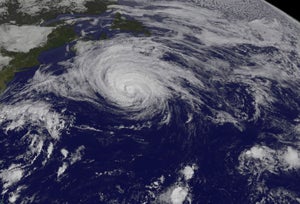When Hurricane Joaquin was gaining strength in the Caribbean and its path toward the East Coast was uncertain, Rhode Island officials took steps to prepare the state in case the hurricane made landfall in the area. One call they made was to Isaac Ginis, a professor at the University of Rhode Island’s Graduate School of Oceanography and a leader in forecasting the path and strength of hurricanes.
Ginis shared the results of his computer model with Lenny Guiliano, the state meteorologist at the Department of Environmental Management, who asked for Ginis’s insights about where the hurricane would strike. Ginis advised Giuliano that it appeared the state would be spared the fury of Hurricane Joaquin, and Guiliano provided that information to state officials during a briefing at the Rhode Island Emergency Management Agency.
Rhode Island was lucky this time, but that won’t always be the case. Which is why Ginis and other URI experts are ready to provide assistance in whatever way they can whenever an emergency arises in the state. Ginis has spoken about hurricane forecasting at numerous meetings of the Emergency Management Agency and the Rhode Island National Guard, and he expects that his level of engagement with the state will increase the next time a hurricane bears down on the region.
Through a new partnership with the Department of Homeland Security, the University will soon also provide information about hurricane forecasting, storm surge predictions, and other data to the Coastal Resilience Center for Excellence at the University of North Carolina at Chapel Hill. That information will be incorporated into the center’s assessments, which will be shared with the Federal Emergency Management Agency, the U.S. Coast Guard and other federal agencies.
“The goal of this new partnership is to work hand-in-hand with the Center for Excellence by providing them with additional information so their predictions and advice can be refined before they provide it to the agencies,” said Thomas Miller, director of administration at the Graduate School of Oceanography and the principal investigator of the partnership. “The agencies can then use that information when making decisions about resource allocations and storm preparedness.”
The URI Coastal Institute, led by Professor Judith Swift, also plays a vital role in supporting state agencies in storms, oil spills and other environmental emergencies. It has a memorandum of understanding with the Department of Environmental Management for an initiative called SSEER or Scientific Support of Environmental Emergency Response. This initiative links scientists from URI and other universities with various Rhode Island government agencies that may need their assistance, and it enables a process to deploy personnel and other URI resources in incident-specific support.
“The SSEER agreement has provided a pathway for scientists to provide crucial analysis of environmental impacts, which translates into real dollars for the state of Rhode Island in an incident harmful to the environment,” said Swift. “DEM’s Office of Emergency Response is topnotch, and we are grateful for the partnership and any opportunity to serve them and the people of Rhode Island.”
“We have a great deal of expertise that we can bring to the table when it’s needed,” said Miller, “and we’re happy to be engaged with whichever state or federal agencies that may need our assistance.”
Photo: NASA/NOAA GOES Project

